We all know that we should eat our fruits and veggies, and many of us also know the importance of eating whole grains for optimal health.
But do you know the importance of nuts and seeds and how they can benefit your health?
The Power of Nuts and Seeds for Optimal Health
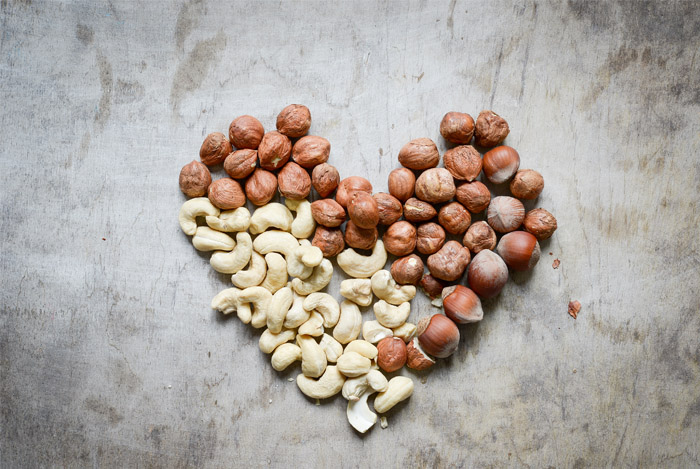
Studies have shown that individuals who regularly eat 1-2 servings of nuts and seeds per day have a longer life due to the way these foods protect the arteries and improve the brain.
There’s further research that shows nuts and seeds play a valuable role in preventing high blood sugar levels making them great for the prevention of Type 2 diabetes or prediabetes.
Nuts and seeds are also wonderful sources of protein, vitamins, and many minerals such as iron, zinc, and magnesium.
The key to eating nuts the healthy way is to eat them raw and unprocessed, not coated in oil and salt. They taste absolutely delicious all on their own and can help train your taste buds to enjoy the taste of higher fiber sources of protein and healthy fats.
How Much to Eat?
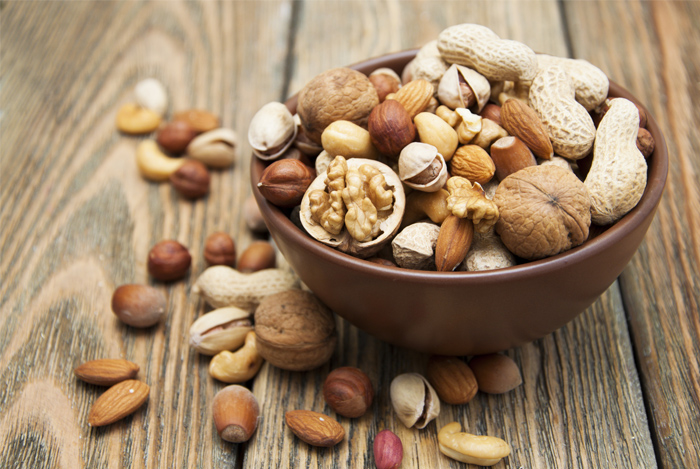
Adding just 1 – 2 ounces of nuts and/or seeds per day is all you need to get the benefits these foods have to offer. One ounce of most nuts and seeds is the equivalent of a small handful or 2 tablespoons of nut butter.
Here are five different nuts and seeds that can help you live a longer life and enhance your meals at the same time!
5 Nuts and Seeds to Start Eating Today
1. Almonds

Let’s start with one of the most popular types of nuts and seeds that have been shown to improve multiple facets of health.
Almonds are a wealth of protein, iron, vitamin E, fiber, magnesium, vitamin B6, the mineral manganese, and they’re a great source of copper. Each of these nutrients contributes to healthier skin, a healthier heart, and optimal metabolic function. Copper and magnesium can also help improve thyroid health, and vitamin B6 can improve anxiety, blood pressure levels, and brain health.
Almonds are also a great source of a unique type of fat known as monounsaturated fats which have been shown to prevent weight gain in the waist and reduce the risk of heart disease. Finally, they’ve been shown to be a key player in preventing the onset of osteoporosis.
Buying Tips:
Buying raw almonds is important, but buying organic is even more optimal. Almonds are one of the most highly treated nuts and seeds when it comes to pesticide contents, and many brands pasteurize their almonds with chemicals.
Purchase raw and unpasteurized almonds when possible, or purchase raw sprouted almond butter. You can also find organic almonds and almond butter online, just look for those without added sugars, salt, and/or added oil.
Healthy Ways to Use Them:
Here are some great ways you can use raw almonds or raw almond butter if you haven’t already tried them.
- Eat raw almonds as a snack
- Add raw almonds to trail mix
- Top salads with raw almonds
- As an oatmeal topping
- Mixed into chia pudding
- Drizzled onto roasted veggies
- Blend almond butter or almonds with water to make homemade almond milk
- Add them to any entrée
- Blend them with frozen bananas to make a healthy ice cream
- Sneak them into smoothies
- Use almond butter in place of eggs when baking
- As an alternative to peanut butter
- Eat an ounce with an apple for a snack.
- Spread almond butter on bananas
2. Pumpkin Seeds

Pumpkin seeds are also incredible sources of iron, protein, magnesium, and fiber. They’re one of the best seeds to eat since they’re also high in chlorophyll making them great for fighting off inflammation and improving alkalinity.
Pumpkin seeds have even been shown to have antiviral effects and may be effective for treating fungus and candida yeast overgrowth. They contain properties that fight off bad bacteria and have been shown to improve immune health.
Pumpkin seeds are also great sources of the amino acid tryptophan which reduces stress and improves mood. But aside from their health benefits, pumpkin seeds also taste delicious and are easy to find just about anywhere.
Buying Tips:
Look for raw pumpkin seeds, and preferably those that haven’t turned brown in color. A bright green color indicates they’re fresher meaning they’re better for you and will also taste better.
Pumpkin seeds can also be bought in their shells, which is great if you’re looking for a similar snack to sunflower seeds in their shell. However, if you’re just looking to toss the seeds into recipes or use them as a topping, purchase them unshelled for easy access.
You can find pumpkin seeds online and at your local health food store. They’re very affordable per serving and a little will go a long way towards crushing an afternoon craving!
Healthy Ways to Use Them:
- Mix them with raw almonds, cashews, walnuts, and raisins or goji berries to make your own trail mix
- Add them to oatmeal
- Blend them into a smoothie
- Put them in your food processor and make your own pumpkin seed butter
- Add them to cooked veggies
- Sneak them into entrées for a nice crunch and healthy fats
- Top salads with them
- Eat them by themselves for a quick pick-me-up
- Pair them with an orange for a tasty snack
- Blend them with water to make your own pumpkin seed milk
- Sprinkle them onto sprouted grain toast with unsweetened applesauce or apple butter
3. Cashews
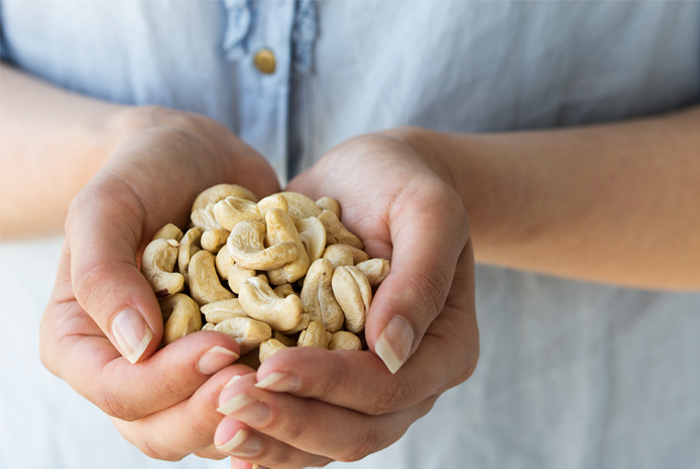
Cashews aren’t a true tree nut and they’re actually closer to legumes in how they grow. Cashews are part of the drupe family of plants which grows from the ground similar to the way peanuts (another legume) do.
However, cashews hold many of the same valuable health benefits of other nuts and seeds. They are extremely good sources of iron, magnesium, Vitamin B6, and monounsaturated fats. Per serving, they’re also lower in fat per serving making them good for people watching their overall fat intake.
The most well-known benefit of cashews in the culinary world is their unique ability to replace dairy in recipes. When soaked and blended, cashews turn into a thick and creamy spread that can be used in place of cheese or even butter. This makes them especially healthy since they offer more nutritional benefits than dairy and don’t come with the health risks that cow’s milk does.
Buying Tips:
When purchasing cashews, do your best to stick with unroasted cashews. We all know roasted cashews are tasty, but when you heat nuts and seeds, many of their benefits are lost through the roasting process.
Raw cashews are very affordable and will also provide a milder taste to recipes when you’re looking to use them in place of dairy. You can find them at any health food store or online for just cents per serving.
Healthy Ways to Use Them:
- Mix them with raw almonds, sunflower seeds, pecans, walnuts, and raisins or goji berries to make your own trail mix
- Add cashews or cashew butter to oatmeal
- Make your own homemade cashew milk with cashew butter or cashews
- Sprinkle them onto salads
- Add the to quinoa pilaf dishes
- Stir them into ethnic-flavored dishes like a veggie and rice stir-fry
- Blend them with some water, apple cider vinegar, lemon, and pepper to make a healthy salad dressing
- Make your own cashew butter with soaked, raw cashews
- Snack on them with some fresh fruit, such as berries
- Use cashew butter in place of peanut butter
4. Pecans
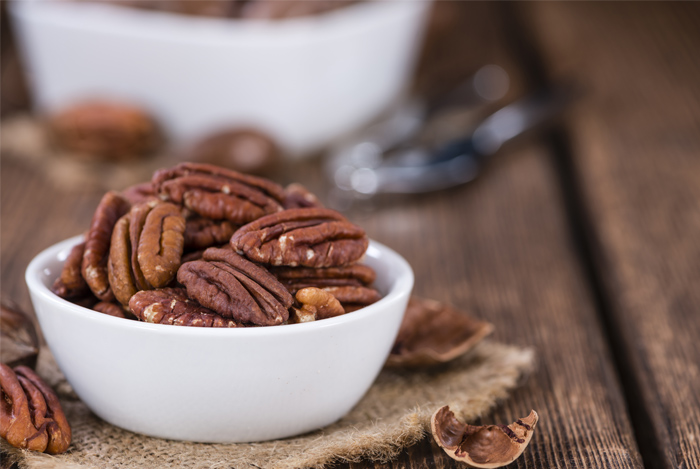
Pecans are some of the most overlooked nuts and seeds that offer tremendous health benefits in many different ways. They’re excellent sources of energy and contain many vitamins, minerals, and antioxidants that make them worthy of being in anyone’s diet.
Like almonds, pecans are high in monounsaturated fats and they help improve cholesterol levels by lowering LDL (bad cholesteroL) and improving levels of HDL (good cholesterol levels).
They’re also packed with magnesium, iron, calcium, selenium, and zinc like almonds and pumpkin seeds.
In addition, pecans are also high in antioxidants that contribute to beautiful skin and a healthy heart.
These antioxidants include ellagic acid, vitamin E, beta-carotene, lutein, and zeaxanthin. Many studies show that antioxidants such as these have been proven to fight off free radicals that increase the risk for disease and increase the effects of aging. They may even help fight off the risks associated with cancer and early death.
Pecans are also one of the highest sources of B vitamins when it comes to nuts and seeds. They offer each of the following B vitamins: riboflavin, niacin, thiamin, pantothenic acid, vitamin B-6, and folate. B vitamins help improve your mood, metabolism, thyroid function, digestion, and overall nervous system health.
Buying Tips:
If you’re not lucky enough to live near a pecan tree and get them fresh during the fall season, then be sure to pick up some raw pecans that are shelled next time you visit your local health food store. You can also find raw pecans online very affordably, and most companies that sell them offer high-quality options.
Like other nuts and seeds, you can now find pecans in the form of a spreadable nut butter. Raw pecan butter is readily available from many high-quality brands both in stores and online.
Healthy Ways to Use Them:
- Add pecans to oatmeal or quinoa porridge, or use them in overnight oatmeal
- Top your next smoothie with crushed pecans for a fun crunch and extra nutrition
- Include them in a raw trail mix with goji berries, mulberries, raw almonds, sunflower seeds, and walnuts
- Make homemade pecan butter with raw pecans
- Blend pecans or pecan butter with water to make your own pecan milk
- Top homemade baked goods with them or bake with them for a nutty flavor
- Process them in a food processor and use the crumbs as a topping for sweet potatoes or winter squash
- Top salad with them
- Snack on them with berries or an apple
- Add them to your next lunch for an extra boost of protein!
5. Sunflower Seeds

Sunflower seeds don’t just make a great ballgame snack; they’re also easy to add to just about any meal or snack you can think of.
Plus, these seeds are one of the most nutrient-dense seeds you can get your hands on too, offering fiber, magnesium, protein, iron, Vitamin E, copper, zinc, and many B vitamins in just a small serving.
Sunflower seeds are also one of the highest sources of monounsaturated fats per serving of all nuts and seeds. Their earthy, nutty, and slightly sweet flavor also make them easy to enjoy.
Sunflower seeds also contain many phytosterols which are compounds found in plants that have been shown to improve heart health and reduce total cholesterol levels. Phytosterols are also beneficial for preventing the risk of cancer and heart disease.
The magnesium in sunflower seeds also offers benefits for your brain, bones, heart health, nervous system function, and your digestion. Speaking of digestion, sunflower seeds are also good sources of fiber to help keep your body working at optimal levels.
Buying Tips:
Sunflower seeds are very easy to find in their raw state and they’re one of the most affordable nut and seed options on the market.
You can also find sunflower seed butter which tastes somewhat similar to peanut butter and is used as a replacement to peanut butter for those that have a peanut allergy.
Healthy Ways to Use Them:
- Mix them into overnight oatmeal
- Top your next bowl of oatmeal with them
- Blend them with some water, herbs, spices, and a little water to make a homemade dressing
- Grind them into flour and use them in baked goods
- Make your own sunflower seed butter
- Blend them with water to make your own sunflower seed milk
- Make your own trail mix with them using your favorite dried fruits and other nuts like those above
- Make homemade LSA mix which is a combination of flax, sunflower seeds, and almonds and used as a topping just like granola
- Add them to homemade granola
- Top salads with them
- Snack on them with fresh fruit
- Add them to cooked veggie entrées or raw dishes of any kind
More Healthy Nut and Seed Options:
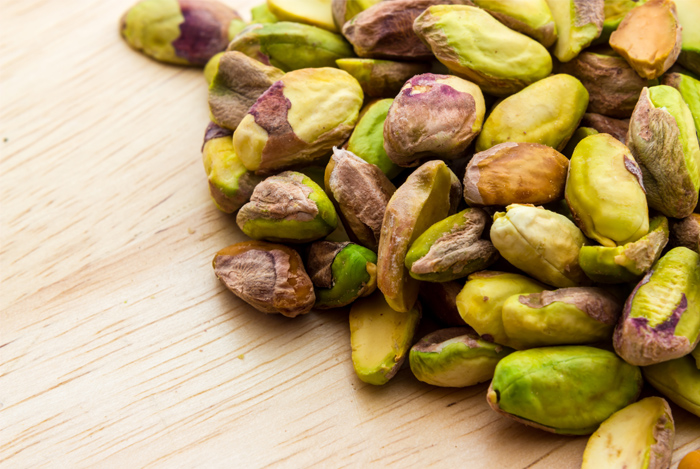
- Flax Seeds – rich sources of omega-3 fatty acids and fiber, eat them ground for optimal absorption
- Chia Seeds – high in fiber and omega-3 fatty acids, complete source of protein
- Hemp Seeds – high in protein, iron, magnesium, omega 3, 6 and 9 fats, complete sources of protein
- Walnuts – good source of omega-3’s, protein, B vitamins, zinc, magnesium, and copper
- Macadamia Nuts – High in monounsaturated fats, good source of manganese, copper, and other trace minerals, low in carbs and protein
- Peanuts – One of the best foods for your heart, high in monounsaturated fats, complete source of protein, high in iron, fiber and B vitamins, great source of magnesium and Vitamin E
- Brazil Nuts – Contains 100 percent of your daily selenium needs per nut, high in healthy fats, good source of many trace minerals low in carbs
- Pistachio Kernels – alkaline, good source of Vitamin E, high in protein, low in fat per serving
All nuts and seeds should be included as a part of a healthy diet, but like all fats, be mindful of serving sizes and how they affect your digestion and energy.
Many people do well with certain types of nuts and seeds but may have reactions to others just like they do whole grains. Soaking nuts and seeds may also help you digest them more easily if you find this to be an issue.
Try adding an ounce of raw nuts and seeds to your daily diet and see what benefits they can offer you. Used in place of high-fat butter, cheese, and processed oils, nut and seeds just might save your life and help you lose weight too.
For more healthy tips like this article provides, check out these tips on eating for optimal skin health!
The post 5 Nuts and Seeds That Can Help You Live a Longer Life appeared first on Nutrition Secrets.
http://www.nutritionsecrets.com/5-nuts-and-seeds-that-can-help-you-live-a-longer-life/
No comments:
Post a Comment